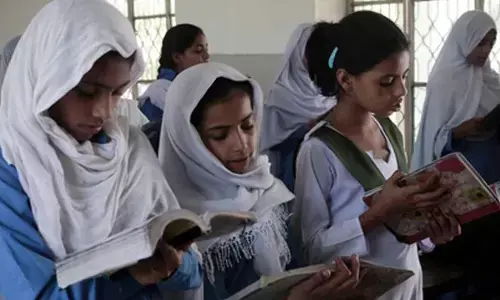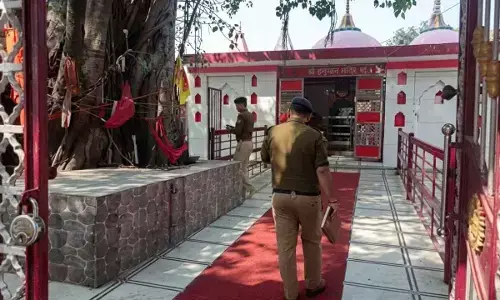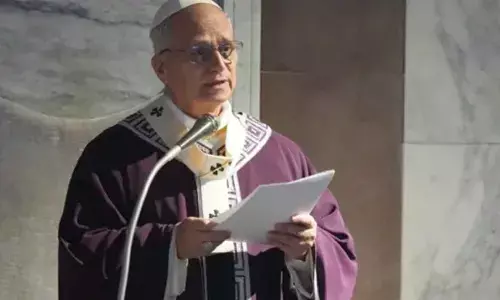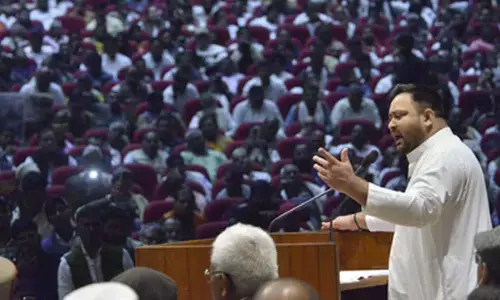Sahir Ludhianvi; Doyen of Progressive Urdu Poetry

Sahir Ludhianvi; Doyen of Progressive Urdu Poetry. This October 25 marked 35th death anniversary of Indian subcontinent’s legendary poet lyricist, Sahir Ludhianvi. Three and half decades have passed since his death but his popularity is still intact in India and surrounding countries.
 This October 25 marked 35th death anniversary of Indian subcontinent’s legendary poet lyricist, Sahir Ludhianvi. Three and half decades have passed since his death but his popularity is still intact in India and surrounding countries. Indian cinema ensured fame of legendary songwriter doesn’t wane in the culturally hollow environment that forgets as fast as foretells literary giants.
This October 25 marked 35th death anniversary of Indian subcontinent’s legendary poet lyricist, Sahir Ludhianvi. Three and half decades have passed since his death but his popularity is still intact in India and surrounding countries. Indian cinema ensured fame of legendary songwriter doesn’t wane in the culturally hollow environment that forgets as fast as foretells literary giants.
Born Abdul Hayee on 8 March 1921 in Ludhiana city of Punjab, he chose penname, Sahir Ludhianvi to associate with the place of birth. Troubled childhood of being deprived of comforts or growing under constant fear psychosis in adolescent period depicts in his poetry to exasperate negative experiences encountered then and literally scarring him for whole life. His father’s immoral lifestyle, repeated tortures and ill-treatment meted out on his mother brought uncertainty in mother and sons’ lives. He couldn’t forget bitter memories until death on 25 October 1980.
Sahir Ludhianvi distinguished him in Urdu poetry with that works that enlivened Indian cinema. “His poetry won’t fade so easily,” foresees biographer, Akshay Manwani in this book. He further stresses that “Sahir’s poetry is a brilliant portrayal of multiple aspects of his personality as a songwriter. His poetry was immortalized by Indian cinema in his lifetime itself through his poems being voiced during golden era of Indian cinema that ceased to exist without Urdu’s contribution.
The book is an immaculate research on Sahir Ludhianvi’s life and works. A narration of his agonies and relationships with men, women, peers or friends to his professionalism, Sahir Ludhianvi: The People’s Poet is a must read and an addition in treasure of works on this legend.
Highly research based description of Sahir Ludhianvi’s personality turns this book valuable asset for us to know the poet of an unequal caliber. His penchant for poetry was an interesting story—“His own inclination aside, one person responsible for Sahir’s development as a poet was his teacher at Malwa Khalsa High School, Faiyaaz Haryanvi. The Maulana taught him Urdu and Persian and fostered in his young ward a taste for poetry and literature. Other influences he admitted to be of Urdu poets of early to mid-twentieth century—Muhammad Iqbal, Faiz Ahmed Faiz, Majaz Lucknawi and Josh Malihabadi (Sahir Ludhianvi: The People’s Poet – p-13).
Sahir Ludhianvi’s poetry had greater influence of progressive writers but he didn’t restrict his arena. Poems and songs vitrine the pain and they prognosticate bitterness of human relationships. This book details his personality traits and habit to value the relationships above everything. He had to struggle a lot in the early days before formal entry into songwriting. Following lines define his agonies and successes—“The late Krishan Adeeb, himself an Urdu poet and a friend and admirer of Sahir from those years in Ludhiana, remembers that most of Sahir’s poems were not accepted for publication. He was not yet a name to reckon with. However, poems like ‘Jahaan Mazdoor Rehtey Hain (Where Workers Reside) was published under the name of A.H Sahir in an underground newspaper named Kirti Lehar. And such poems, as Krishan states, were brimming ideas of revolution (Sahir Ludhianvi: The People’s Poet—p 21).
Sahir Ludhianvi was a poet of the generation which observed the British colonial rule in India logically. Indian subcontinent strived for independence and anguish always prognosticated Sahir to dream for free India. His mature poetry was glad tiding for him to transform into an illustrious person of that era. With revolutionary spirits plus poetic calibers he proved mettle as a poet during late 1943 and early 1944 while first anthology of poems, Talkhiyaan (Bitterness) was published. He was just twenty-three but with that publication he already gave a strong message.
The anthology was translated into many Indian and foreign languages besides original Urdu that is still a popular work of poetry. It was an extraordinarily book with publication of twenty-five editions from Delhi in Sahir’s own lifetime out of which fourteen were in Hindi language. Rest editions were in English, Russian and other foreign languages.
This biography also focuses on the formation of Progressive Writer’s Movement (PWM) in 1936. As an outcome of an incessant effort of Sajjad Zaheer and bunch of contemporary writers, the movement had left an impeccable impact on the masses such as laborers, peasants and middle-class people needing voice to speak up their concerns. Literary endeavors of that movement strongly opposed exploiters oppressing commoners. Sahir Ludhianvi found in that movement his own concerns of traumatized childhood—“As a result of his childhood experiences, that nurtured a distaste for zamindars and capitalism, his interest in communalism and his fervent involvement in student politics in college, Sahir was naturally drawn to PWM and realized that ideas of PWM complemented his poetry (Sahir Ludhianvi: The People’s Poet—p 40).
Sahir Ludhianvi’s songs became voice of many successful films—“Having traversed spectrum of romance, Sahir ultimately, transformed into people’s poet. Moving away from love and its ecstasies, he addressed weightier matters through developing the habit for deep thinking.” This biography portrays his professional plus personal balances and imbalances. His bonding with mother, relatives and igniting relationships with friends are matters to study so are his inspirations for the emerging poets by advocating “writers can’t be honest to justify work until not remain true to their self. Conscience should always remain part and parcel of writers’ thought process.”
His prophecy for poetry was that in real terms it was a manner to express personality of literati as an ultimate source to express self. He caveated that anybody writing contrary to one’s personality with opposite thought processes aimed at categorized in specific genre create new chasm. Hardly one attains satisfaction by such gimmicks. This book narrates his struggling phase until successful days as a songwriter. Extensive contribution in Urdu poetry during his editorship of literary publication Adab-e-Lateef published from Lahore was remarkable while bellowed the agonies.
Yeh jalte huey ghar kiske hain, yeh kat-tey huey tann kiske hain
Takseem ke andhey toofaan mein, lut-tey huey gulshan kiske hain…
Erehbar-mulk-o-qaum bata, yeh kiska lahu hai, kaun mara¡
(Whose houses are these that burn, these bodies that are being butchered – to whom do they belong? In this great mayhem caused by partition, these gardens that are being desecrated to whom do they belong…? O leaders of our nation and community, tell us, whose blood is this, who died here?)
Sahir’s poetry projected the happenings occurring before him from disappointments to reactions and observations on the society. His poem Mafaahmat (A Compromise) composed on India’s independence on 15 August 1947 was an unambiguous warning that raised several questions. He assumed that freedom attained at an altar of communal hate had hollow meaning therefore independence gained at such cost would snowball into a problem of far greater magnitude.
Yeh jashn, jashn-e-masarrat nahin, tamasha hai
Naye libaas mein nikle hain rahzani ka juloos
Hazaar shamaa-e-akhuvvat bujhakey chamkey hai
Yeh teergi ke ubhaarey huey haseen fanoos
Yeh shaak-e-noor jise zulmaton mein seencha hain
Agar fali toh sharaaron ke phool laayegi
Na phal saki toh nayee fasl-e-gul ke aane tak
Zameer-e-arz mein ik zehar chod jeeyegi
(This celebration, is not one of joy, but a circus; In the guise of something new, the attempt to plunder is afoot; After putting out the lights on communal harmony, this radiance; Is of those lanterns that have been nurtured in the dark; Such light that has been cultivated from the throes of darkness; If it spreads, shall only spark many a flame; And if it doesn’t spread, until the break of a new dawn; Will poison this nation’s soul)
Thorough detailing of Sahir Ludhianvi’s truculent time to prosperity while he was a helping hand for others are oddities in that personality. He was even forced to sell his mother’s gold bangles to pay electricity and water bills. Once he rewrote and faired Krishan Chander’s unintelligible handwriting from latters’ scripts for a measly sum of Rs. 150 to make his ends meet.
Sahir Ludhianvi had fulltime entry into Indian film industry in 1951 alongside other songwriters. The genius of works by them provided India’s film song its finest hour through 1950s and early 1960s with immaculate contribution by him and his counterparts. He partnered with stalwarts and his association with S.D Burman in more than 15 movies in a span of seven years’ professional relationship from 1951 to 1957 presented great work of poetry in cinema. Movies Jaal (1952), Taxi Driver (1954), Munimji (1955), Devdas (1955), House No 44 (1955) and Fantoosh (1956) couldn’t attain that success without Sahir’s magical lyrics.
Pioneering lyrics of Sahir Ludhianvi is reminisced for Pyaasa (1957) and vestiges reference point in the Indian cinema’s songwriting history. Notable songwriting works for Yash Chopra’s Dhool Ka Phool (1959) and most of B.R Chopra’s movies starting with Naya Daur (1957) until those in later years were ultimate. His songwriting was appreciated then and still remains pathfinder for new generations—“Sahir’s unique ability to marry poetry and philosophy and take contemptuous view of world, even in a light number, places him several echelons above other songwriters. Sahir took songwriting extremely seriously to make that his identity.
Sahir Ludhianvi’s numinous poem in 1969, while India celebrated Mirza Ghalib’s 100th death anniversary (15 February 1869), showcased his anger and revolution. He wrote Jashn-e-Ghalib (Celebrating Ghalib) to expose the double standards of politicians commemorating Urdu’s finest poet but themselves responsible for demise of Urdu as a language.
Jis ahad-e-siyaasat ne yeh zina zabaan kuchli
Us ahad-e-siyaasat ko marhoomoun ka gham kyun hai?
Ghalib kise kehte hein, Urdu hi kaa Shaayar thaa
Urdu per sitam dhaa kar, Ghalib ke karam kiyun hai?
(The government that crushed this effervescent language; Why should that government grieve over the dead? The man called Ghalib, was a poet of the Urdu language; Why should they be unfair to Urdu and benevolent towards Ghalib?)
Other wonderful poem of Sahir Ludhianvi, Gandhi Ho Ya Ghalib Ho (Be It Gandhi or Ghalib) composed on the occasion of 100th birth anniversary of Mahatma Gandhi (2 October 1969) coinciding Ghalib’s death centenary, lamented the declining prominence of both personalities in the Indian society. He penned the following painful lines:
Khatam karo tahzeeb ki baat,
Band karo culture ka shor,
Satya, ahinsa sab bakwaas,
Tum bhi qaatil hum bhi chor,
Gandhi ho yaa Ghalib ho!
Khatam huwa dono kaa jashn,
Aao inhein ab kar dein dafan!
(Do away with talking about civility; Stop screaming about culture; Truth and non-violence are irrelevant today; You are murderers and so are we; Be it Gandhi or Ghalib; The celebration of both individuals comes to an end; Come, let us bury them once and for all).
This biography raises an imperative question—“Regardless of Talkhiyaan’s overwhelming success and his immensely perceptive poems in Aao Ki Koi Khwaab Bunein, Sahir and his poetry don’t evoke same interest like those of Allama Iqbal, Mir Taqi Mir and Mirza Ghalib among Urdu intelligentsia in the subcontinent. Neither is Sahir taught in classrooms, nor is there a detailed critique of his film or non-film works in Urdu or English by eminent Urdu scholars.”
Sahir Ludhianvi’s ability to merge the social conscience with poetry in songs makes him relevant anytime and every time. He had several firsts in the career as poet and songwriter—like a person being accepted as he was; with his language, vocabulary and imageries. Several successful films have become immensely popular due to his lyrics instead of the tunes or a singer’s prominences.
This book fiercely describes his lifetime from birth as Abdul Hayee to Chaudhri Fazl Mohammed and Sardar begum to death of Sahir Ludhianvi at age 59. This book also has complete list of songs he wrote. It is treasure for Urdu poetry lovers willing to explore his pied creativity.








